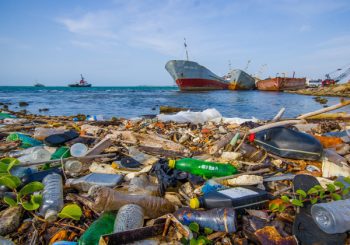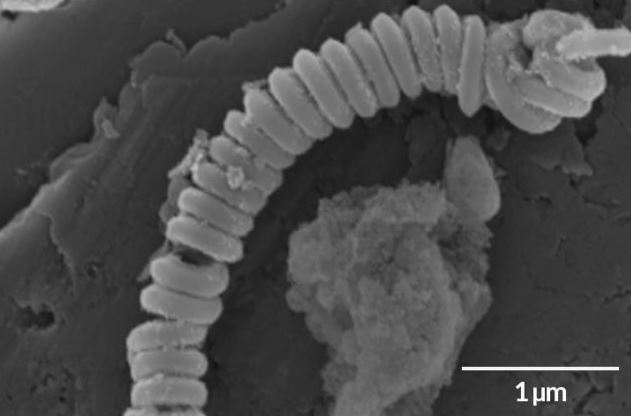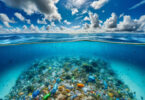Contributing Writer for Wake Up World
The scale of plastic waste in our oceans is enormous. We’ve all seen and recoiled at the photos of precious marine wildlife and birds with plastic-filled stomachs, but as previously reported here on Wake Up World, it’s not only the larger pieces of plastic which are a threat. Microplastics, pieces 5mm across or smaller, are everywhere. According to a 2015 study, there could be up to 51 trillion pieces in our oceans. [1]
Microplastics have been found at the bottom of the Mariana Trench, the deepest point in the ocean. [2] They are also found in the fish and shellfish we eat, and therefore in human excrement. We don’t yet know for sure how the microplastics we ingest harm our health, but it’s a pretty safe bet that they do. The microplastics ingested by marine life are known to cause tumours and liver issues. [3]
Although some innovative ideas are being developed to deal with large plastic waste, combatting microplastics has remained a key problem. That could be about to change, as a new study published in the journal Matter reveals. [4]
Scientists have created microscopic nano tubes, thinner than a human hair, made from carbon and coated with nitrogen and manganese, a magnetic metal. The two coatings create a chemical reaction which results in highly reactive oxygen molecules. This oxidation process decomposes and mineralizes microplastics, turning them into carbon dioxide, water and harmless salts. These end products are harmless to the marine environment, or even potentially beneficial as a carbon source for algae growth.
When lab tested in samples of water contaminated with microplastics, the study showed a 30-50% reduction in microplastics after just eight hours. When a patch of water is cleaned, the nano tubes can be removed using a magnet and saved for re-use.
This project is still at proof of concept stage but could potentially be developed for use in oceans or at wastewater treatment plants. Of course, the long-term solution for plastic pollution must lie in the reduction of our use of plastics, particularly single use plastics. However, even if we succeed in that goal, we’re still left with the issue of how to clean up the mess we have already created. Innovations like this one provide hope for that. As Xiaoguang Duan, co-author of the new study says, “Prevention is always the best solution.” However, he adds, the nano coil technology, if successful, “provides a possible solution to tackle a global problem.” [5]
Article sources:
- [1] https://iopscience.iop.org/article/10.1088/1748-9326/10/12/124006
- [2] https://www.businessinsider.com/microplastics-ending-up-in-creatures-in-the-deepest-parts-of-the-ocean-2019-3?r=US&IR=T
- [3] https://www.nature.com/articles/srep03263
- [4] https://www.cell.com/matter/fulltext/S2590-2385(19)30056-6
- [5] https://www.businessinsider.com/plastic-pollution-magnetic-coils-could-break-down-microplastics-2019-8?r=US&IR=T
About the author:
Nikki Harper is a spiritualist writer, astrologer, and current editor for Wake Up World.

If you've ever found value in our articles, we'd greatly appreciate your support by purchasing Mindful Meditation Techniques for Kids - A Practical Guide for Adults to Empower Kids with the Gift of Inner Peace and Resilience for Life.
In the spirit of mindfulness, we encourage you to choose the paperback version. Delve into its pages away from screen glare and notifications, allowing yourself to fully immerse in the transformative practices within. The physical book enriches the learning process and serves as a tangible commitment to mindfulness, easily shared among family and friends.
Over the past few years, Wake Up World has faced significant online censorship, impacting our financial ability to stay online. Instead of soliciting donations, we're exploring win-win solutions with our readers to remain financially viable. Moving into book publishing, we hope to secure ongoing funds to continue our mission. With over 8,500 articles published in the past 13 years, we are committed to keeping our content free and accessible to everyone, without resorting to a paywall.








